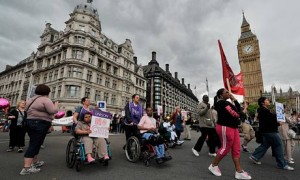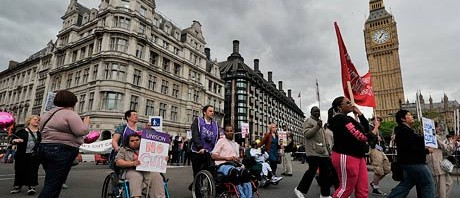
Disabled people demonstrate against benefit cuts outside parliament last year. Photograph: Carl De Souza/AFP/Getty Images
Some long-term sick and disabled people face being forced to work unpaid for an unlimited amount of time or have their benefits cut under plans being drawn up by the Department for Work and Pensions.
Mental health professionals and charities have said they fear those deemed fit to undertake limited amounts of work under a controversial assessment process could suffer further harm to their health if the plans go ahead.
The new policy, outlined by DWP officials in meetings with disabilities groups, is due to be announced after legal changes contained in clause 54 of the welfare reform bill have made their way through parliament.
The policy could mean that those on employment and support allowance who have been placed in the work-related activity group (Wrag) could be compelled to undertake work experience for charities, public bodies and high-street retailers. The Wrag group includes those who have been diagnosed with terminal cancer but have more than six months to live; accident and stroke victims; and some of those with mental health issues.
In official notes from a meeting on 1 December last year, DWP advisers revealed they were not intending to put a time limit on the work experience placements.
When asked at the meeting if there was a maximum duration to the placements, the reply was: “There are no plans to introduce a maximum time limit.”
Currently there is an eight-week limit on non-disabled jobseekers taking part in the government’s work experience programme, and a six-month limit on unpaid work for a new pilot called the community action programme.
When concerns on financial penalties were raised at the meeting, officials said: “Ministers strongly feel there is a link-up to support those moving close to the labour market, and the individual’s responsibility to engage with the support. Ministers feel sanctions are an incentive for people to comply with their responsibility.”
A DWP presentation on the proposal reads: “This is a supportive measure and claimants will only be asked to do this where it is suitable in their personal circumstances.”
The latest figures reveal there are just over 300,000 claimants in the Wrag group – a number which is expected to rise as coalition reforms continue – and 8,440 of them have already incurred sanctions in the period from September 2010 to August 2011 for offences such as missing interview with advisers “without good cause”.
The Royal College of Psychiatrists (RCP) fears that managers in jobcentres and private companies who specialise in getting people back to work have inadequate health expertise and will push those with mental health issues into inappropriate placements. In a consultation response sent to the DWP, the RCP said one of its key concerns was around “the capacity of relevant members of staff in Jobcentre Plus and work programme providers to make appropriate decisions about what type of work-related activity is suitable for claimants with mental health problems”.
The college also said it would prefer the placements to be optional.
Neil Bateman of the National Association of Welfare Rights Advisers said: “This proposal is very worrying. There are completely inadequate legal and medical safeguards – bearing in mind that these are people with long-term health problems and disabilities, often serious ones.
“Compulsory, unpaid work may worsen some people’s health, with the consequences of the DWP’s savings being passed on to the NHS at greater cost.
“If jobs are there to be done, people should get the rate for the job, instead of being part of a growing, publicly funded, unpaid workforce which, apart from being immoral, actually destroys paid jobs.”
Neil Coyle, director of policy and campaigns at Disability Rights UK, said: “Sanctions should be applied only in extreme cases, given the likely impact of taking someone’s sole income away. And it is questionable whether genuinely disabled people should be under mandatory and often inflexible systems when the focus for many should be on managing health conditions or rehabilitating after an accident or injury.”
Coyle also suggested that it was abusive for people to work without pay. He added: “The idea that disabled people should work but receive no financial recognition for contributing is perhaps a level of abuse in and of itself.
“
“When Conservative backbench MP Philip Davies suggested [last year that] disabled people should work for less than the national minimum wage, he was castigated, but it now appears to be government policy.”
Vicki Nash, head of policy and campaigns at the mental health charity Mind, said: “Work placements can be a useful bridge for people in the work-related activity group who are taking steps towards employment, but we are very worried about people being pressured into taking unpaid positions before they are ready.”
Nash said the work capability assessment process run by French firm Atos remained “deeply flawed”.
“Many people have been wrongly assessed and put in Wrag despite evidence to the contrary. If these people are then given a mandatory work placement this could be very damaging to their mental health, pushing them further away from the prospect of paid employment.”
The DWP said that although there was nothing in the proposals to prevent terminally ill cancer patients from being financially penalised for refusing work experience placements, it believed it would be “absurd” for jobcentre managers to apply sanctions in such cases.
A DWP spokesperson said: “It is clear that some groups wish to label people with a variety of illnesses and conditions as unable to work. This is not only wrong, it is unfair to those individuals who despite their illness want to keep working.
“Our reforms look at what an individual can do and wants to do. For those claimants for whom work is not a realistic option, there will be unconditional support available.”
On whether the placements would be of unlimited duration, the DWP said: “Placements would normally be short-term, but there is currently no set duration and this will generally be agreed between the adviser and claimant.”
guardian.co.uk © Guardian News & Media Limited 2010
Published via the Guardian News Feed plugin for WordPress.


2 Responses
Absolutely no sanctions full stop. DWP the onus is on you to prove the ill are fit and not by some unprofessional implementation of reform.The onus is on DWP. This country is governed by law. These laws are enforced rigorously.Laws I may add that are steeped in time and would take years to overturn or revoke.DWP and ATOS please Keep providing inaccurate and falsified medical statements and I promise when each case we work on, to get tribunal to over turn every 1 of your decisions, based on medical evidence and fact. Sanctions will only work on the ill informed.www.bufferzone.org.
We’ve got a helluva fight on our hands, see you in The Tribunals and on the Streets, in Black.